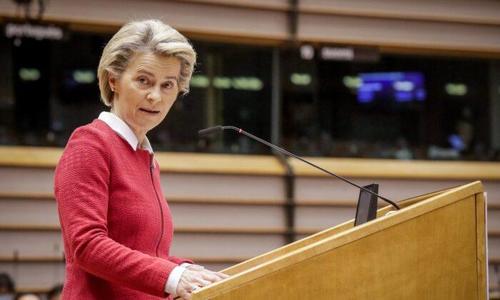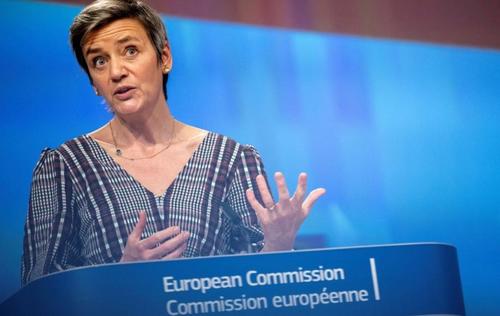On the cusp of the province's centenary this month, Arlene Foster announced her resignation as Northern Irish first minister on April 28 after members of her Democratic Unionist Party (DUP) urged even…

www.france24.com
How Brexit created a ‘recipe for endless tension’ among Northern Irish unionists
Issued on: 29/04/2021 - 22:27Modified: 29/04/2021 - 22:36
A woman walks past a Loyalist poster decrying the Brexit withdrawal agreement's Northern Ireland Protocol in Belfast on April 19, 2021. © Paul Faith, AFP
Text by:
Tom WHEELDON
7 min
Arlene Foster announced her resignation as Northern Irish first minister on Thursday after members of her Democratic Unionist Party (DUP) urged even stronger opposition to the customs border in the Irish Sea – the latest sign of the fear and anger Boris Johnson’s Brexit deal has provoked among unionists.
Whenever instability flares in
Northern Ireland,
British political commentators frequently reference
Winston Churchill’s famous line from 1922 that “the whole map of
Europe has been changed […] but as the deluge subsides and the waters fall short we see the dreary steeples of Fermanagh and Tyrone emerging once again”.
The cataclysm of
World War I had suspended the 1914 Irish Home Rule Act granting self-government to the whole of Ireland, the prospect of which had prompted Ulster Protestants to create a paramilitary force out of desire to remain in the UK. After the carnage on the Western Front ended, Ulster Protestants’ unionist demands roared again – leading to the creation of Northern Ireland in 1921 to protect their British identity.
Now as the Brexit deluge subsides and Northern Ireland prepares to mark its centenary in May, it is the map of the UK that has been changed – with a customs border separating the province from Great Britain and reawakening old unionist fears of separation from the mainland.
A vindicated warning
The Northern Ireland Protocol in the Brexit withdrawal deal replaced the
prospect of a problematic frontier between the UK and the Republic of Ireland with the
reality of a problematic frontier between Northern Ireland and Great Britain.
The protocol keeps Northern Ireland aligned with many EU laws while Great Britain can diverge from them, necessitating checks on goods flowing between the two parts of the UK.
When Prime Minister Boris Johnson finally struck an agreement with the EU in October 2019, Brexiteers – and many others suffering from
Brexit fatigue – greeted the divorce deal with euphoric relief after three years of interminable wrangling over the Northern Irish border under his predecessor, Theresa May. But the Democratic Unionist Party (DUP) expressed outrage about the customs frontier in the Irish Sea. “It isn’t Brexit for the whole of the United Kingdom,” the party’s deputy leader Nigel Dodds told journalists at the time.
Jonathan Powell, ex-PM Tony Blair’s chief negotiator for the 1998 Good Friday Agreement, was one of the few voices in the British establishment to warn that Johnson’s deal posed a serious threat to Northern Irish unionists’ interests. “The hard border in the Irish Sea is a real problem for them,” Powell wrote in the
Irish Times soon after Johnson reached the deal.
“It will grow wider over time as the UK diverges in terms of regulation and as we introduce new tariffs,” Powell continued. “And that widening border will threaten their British identity.”
Powell was vindicated when the Irish Sea border disrupted food supplies and online shopping deliveries as Brexit kicked in on January 1, 2021 – and then in early February when graffiti opposing the customs border emerged in unionist areas while authorities had to suspend customs checks at Northern Irish ports due to “menacing behaviour” from some loyalist militants.
‘A recipe for endless tension’
Out of fear that this trade frontier constitutes too much of a barrier between Northern Ireland and Great Britain, the Loyalist Community Council (LCC) representing paramilitary groups withdrew their support for the Good Friday Agreement, telling Johnson in a letter that “if you or the EU is not prepared to honour the entirety of the agreement then you will be responsible for [its] permanent destruction” – while emphasising that opposition to the Northern Ireland Protocol must be “peaceful and democratic”.
In early April, things kicked off – with a week of street violence in unionist areas until protesters and rioters stopped upon news of the death of Prince Philip out of respect for the Royal Family.
The LCC said it was not involved and urged calm – while warning there had been a “spectacular collective failure to understand properly the scale and nature of Unionist and Loyalist anger” over the protocol.
The DUP rank-and-file ousted Foster in large part because they want a harder line against the customs border. However, it is unclear how the party’s stance could be any stronger: Foster had repeatedly urged the EU to scrap the protocol. Brussels is adamant that the protocol cannot be changed, rejecting Foster’s demands and launching legal action against the British government’s move to introduce changes in March.
This standoff looks intractable and is set to keep the DUP in a position of impotent complaint, said Tim Bale, a professor of politics at Queen Mary, University of London. “It’s a classic case of an irresistible force meeting an unmovable object – a recipe for endless tension if not imminent chaos.”
‘An incredible betrayal’
Yet throughout the Brexit saga the DUP seemed blind to the factors that ultimately led to the protocol.
The party backed Leave in the 2016 referendum. However, the DUP “didn’t think through the implications of a Leave vote, especially for the Irish border”, noted Jon Tonge, an expert on Northern Irish politics at Liverpool University. “It expected a narrow Remain win and didn’t have a clue what to do when the UK actually voted Leave.”
The DUP gained disproportionate power following the 2017 general elections: The votes of its 10 MPs propped up May’s government after she lost the Conservatives’ majority. But they refused to support her withdrawal deal – on the grounds that it would have kept the UK under EU rules for an indefinite period – then backed May’s successor Johnson.
“The DUP clearly miscalculated by not acceding to May’s Irish backstop, which would at least have seen Northern Ireland treated the same as the rest of the UK as far as customs regulations were concerned,” Bale observed. “Who knows what magical solution they thought might provide a workable alternative? But trusting Boris Johnson, of all people, to keep his word and come up with one always did beggar belief.”
Johnson told the 2018 DUP party conference that “no British Conservative government could or should sign up to any […] agreement” requiring custom checks in the Irish Sea – a year before he did exactly that as prime minister. “It was an incredible betrayal,” as Tonge put it.
Vote on a united Ireland a question of ‘when, not if’
But even more than Johnson throwing them under the bus, perhaps the biggest tragedy for the DUP is that Brexit has weakened Northern Irish unionism, the party’s
raison d’être. Polls suggest unionism still has a
lead over Irish nationalism in the province – but it has
narrowed since the 2016 Brexit referendum.
Demographic trends have
shifted in favour of Northern Ireland’s largely nationalist Catholics over the past two decades. Nevertheless, religious identity in the province is no longer interchangeable with political identity. The 2011 UK census showed that 45 percent of Northern Irish said they came from a Catholic background, but only 25 percent expressed an exclusively Irish identity.
In light of this, until the Brexit referendum it seemed that Northern Irish unionism would resist the demographic headwinds. After the 1998 Good Friday Agreement ended decades of sectarian conflict and created a power-sharing arrangement in Belfast, there emerged a “growing proportion” of the Catholic population feeling “comfortable” within the UK, explained Katy Hayward, a professor of political sociology at Queen’s University Belfast and a senior fellow at the UK in a Changing Europe think-tank.
Many such people “like aspects of the UK such as the National Health Service”, Tonge added. While they would “never vote for unionist parties”, a lot of these Northern Irish Catholics had come to “quietly see themselves as small ‘u’ unionists”, he continued.
Brexit was an “overhaul of the status quo” that took Northern Ireland out of the EU despite 56 percent of voters in the province choosing Remain, Hayward noted. “This exposed some of the consequences for Catholics and nationalists of being in the union and led to deep unease – particularly as it led to the prospect of a hard border with the Irish Republic, an open border being so important for nationalists and Catholics,” she continued.
The Good Friday Agreement requires a referendum – called a “border poll” when referring to Northern Ireland – if the British secretary of state responsible for the province thinks a majority would vote for a united Ireland. The agreement allows for a border poll every seven years.
“It’s a question of when, not if, there’s a referendum, although I don’t see it as imminent,” Tonge said. “I would expect the unionists to win the first one, but I think there will be more than one – if the nationalists lost narrowly it wouldn’t be the end of the story.”






















